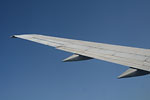Fears for low-cost flights as Ryanair slashes passenger numbers from Britain by 30%
Ryanair is cutting the number of flights it runs from the UK as demand for air travel slumps.
The no-frills airline said it would reduce the number of flights from Stansted by 30 per cent this winter, while 40 per cent fewer aircraft will operate from the Essex airport.The Irish airline will cut the number of aircraft at the airport from 40 this summer to 24 over the winter. It will move the 16 aircraft to other European bases.
Ryanair now expects to carry 2.5million fewer passengers from Stansted, between October this year and March next year. The move comes after its load factor - the measure of the proportion of seats that it fills on its flights - fell by 2 per cent last month.However, it blamed the latest cutback on 'unfair' passenger taxes alongside high charges imposed by airport operator BAA.
The airline said that in recent months the Belgian, Dutch, Greek and Spanish governments had scrapped tourist taxes or reduced airport charges to zero to stimulate tourism.At the same time, the British government is increasing passenger taxes from November. Ryanair chief executive Michael O'Leary said: 'Sadly, UK traffic and tourism continuesto collapse, while Ryanair continues to grow traffic rapidly in those countries which welcome tourists instead of taxing them.
'Ryanair's 40 per cent capacity cutback at London Stansted shows just how much Gordon Brown's £10 tourist tax and the BAA monopoly's high airport charges are damaging London and UK tourism and the British economy generally.'
The 'tourist tax' that Mr O'Leary is referring to is the planned increase in passenger duty on short-haul flights from £10 to £11 from November, rising to £55 for long journeys of more than 6,000 miles. The 'green' charges will rise dramatically from 2010, starting at £24 on short-haul and reaching £170 on the longest flights.Ryanair's cutback will be a blow to Stansted, which has been the airline's major base during the boom in low-cost flying over the past decade.
Ryanair (FR до PDV)
Re: Ryanair
There's always a reason to fly...
-

amcho - супер спотър
- Мнения: 1829
- Регистриран на: 31 Дек 2007 18:03
- Местоположение: По света у и нас
Re: Ryanair
- Блог за авиация и пътешествия
- форум за пътешествия
- форум за пътешествия
- Jair
- супер спотър
- Мнения: 702
- Регистриран на: 21 Ное 2007 03:35
Re: Ryanair
Пуснали са полети от Милано(Бергамо) до Lanzarote,Tenerife South и Gran Canaria като от Мадрид са пуснали същите дестинации.Само че все още не излизат в продажба има ги само на картата с дестинации.
SWITCH OFF or FUCK OFF
SaVe TheIr pLaNeT
CuT yOuR eMiSsIoN
SaVe TheIr pLaNeT
CuT yOuR eMiSsIoN
-

randi - супер спотър
- Мнения: 2183
- Регистриран на: 13 Дек 2007 16:50
- Местоположение: София
Re: Ryanair
Ryanair запо4на да усеща последиците от агресивната си ценова политика.Акциите на ирландската авиокомпания паднаха с 28 цента до 3.09 евро за акция.Спадът бе продиктуван от новината за о4акваната по ниска нетна пе4алба в края на годината.Първона4ално се прогнозираха приходи в рамките на 250-300 милиона паунда,но от лоу кост превозва4а казаха 4е цифрите едва ли ще надвишат границата от 170 милиона.Изпълнителният директор на Ryanair Маикъл О'Лиъри оба4е заяви с типи4ното за него пер4ене,4е компанията ще продължи с досегашната си ценова политика,защото в условията на финансова рецесия само компаниите които предлагат наи-добрите условия за своите клиенти ще успеят да се задържат на пазара.О'Лиъри също под4ерта 4е се о4аква броят на извозените пътници да се увели4и с 15 процента в сравнение с миналата година до 67 милиона, което ще я постави на първо място сред европеиските авиокомпании по този показател.Според него сега е идеалното време компанията да продължи да се разширява,а като идеална възможност за това би била Италия,където националният превозва4 Алиталия ще намали капацитета си с 28 процента.
- Fredi
- спотър
- Мнения: 26
- Регистриран на: 22 Фев 2009 21:21
- Местоположение: London
Re: Ryanair
Отново - 1 000 000 места за по 1 паунд.
-

harrier - член на екипажа
- Мнения: 5258
- Регистриран на: 16 Дек 2003 17:16
Re: Ryanair
Ryan с 137млн нетна печалба за първата четвърт на 2009!
 дано пуснат и скоро полети до Пловдив
дано пуснат и скоро полети до Пловдив
- pirdop
- спотър
- Мнения: 57
- Регистриран на: 17 Фев 2009 02:45
Re: Ryanair
SWITCH OFF or FUCK OFF
SaVe TheIr pLaNeT
CuT yOuR eMiSsIoN
SaVe TheIr pLaNeT
CuT yOuR eMiSsIoN
-

randi - супер спотър
- Мнения: 2183
- Регистриран на: 13 Дек 2007 16:50
- Местоположение: София
Re: Ryanair
Значи влизат в пряк сблъьъй с EasyJet , които и досега летяха по тези дестинации от Мадрид
- stenk
- супер спотър
- Мнения: 2391
- Регистриран на: 21 Юни 2007 23:06
Re: Ryanair
Easyjet летят до Lanzarote и Fuerteventura.
SWITCH OFF or FUCK OFF
SaVe TheIr pLaNeT
CuT yOuR eMiSsIoN
SaVe TheIr pLaNeT
CuT yOuR eMiSsIoN
-

randi - супер спотър
- Мнения: 2183
- Регистриран на: 13 Дек 2007 16:50
- Местоположение: София
Re: Ryanair
Прав си. Преди време търсех нещо до Канарските острови и от многото инфо бяха забравил , че до Teneriffe и Gran Canaria летят от Лондон 
- stenk
- супер спотър
- Мнения: 2391
- Регистриран на: 21 Юни 2007 23:06
Назад към Авиация + Авиационни новини
Кой е на линия
Потребители разглеждащи този форум: 0 регистрирани и 11 госта
